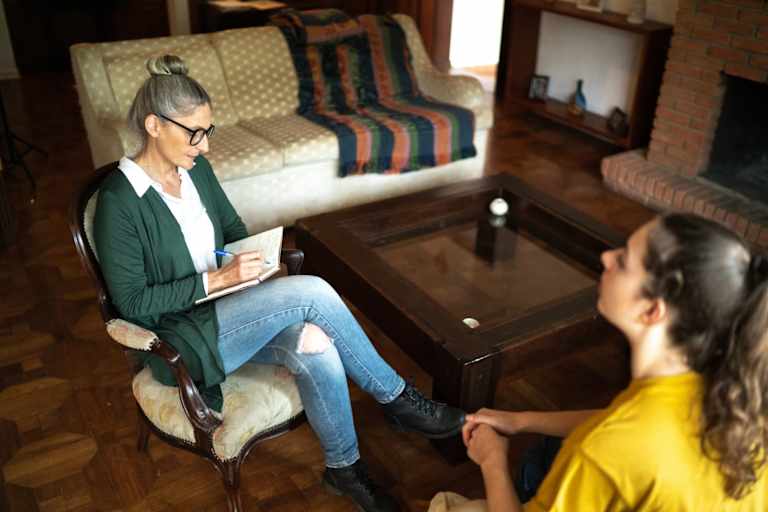Guide to Online Counseling Degrees: Cost, Careers & Requirements
Learn about earning an online counseling degree, including degree types, admission requirements, career options, and potential salaries.At Psychology.org we believe in providing trustworthy and actionable information about degree programs, careers, professional issues, and regional laws concerning the psychology, counseling, and social work professions. Our writers and editors leverage the latest data from primary sources across the site.
We also rely on our freelance Integrity Network, which is comprised of experienced professionals who pull from their first-hand industry experience and expertise to review content for accuracy and completeness. Integrity Network members typically have a graduate or terminal degree and several years of relevant professional experience.
Explore our full list of Integrity Network members.
Key Takeaways
- Schools offer online counseling degrees at the bachelor’s, master’s, and doctoral levels
- Online counseling degree programs combine flexibility with practical training
- A master’s degree in counseling can prepare you to work as a counselor in various fields, including mental health, marriage and family, or school counseling.
What Is a Counseling Degree?
A counseling degree can set you on the path toward various careers helping improve people’s lives. You’ll gain knowledge and skills in counseling theories and practice, cultural competency, psychological assessment, and trauma-informed counseling.
Beginning at the master’s degree level, you can specialize in addictions, clinical, marriage and family, mental health, and school counseling. A master’s degree also qualifies you to apply for state licensure and become a licensed counselor.
Depending on the counseling degree level, you can pursue entry-level counseling careers, become a licensed mental health counselor, or launch a career in academia as a professor and researcher.
You can obtain your counseling degree online but should also expect to complete practicum and internship fieldwork in person. Distance learners can often secure clinical placements in their local areas.
Bachelor’s Degrees in Counseling
At the bachelor’s degree level, you’ll typically find programs in psychology, sociology, and human services. Any of these majors can prepare you for counseling graduate programs and entry-level positions. Bachelor’s degrees in psychology and related fields are widely available online.
You can expect coursework in counseling, human behavior, neuropsychology, research methods, and social systems. Some psychology bachelor’s programs may also offer concentrations in child psychology, counseling psychology, health psychology, industrial-organizational psychology, and substance misuse.
Master’s Degrees in Counseling
Online master’s degrees in counseling combine online coursework with in-person supervised clinical experiences. Hybrid programs may include both online and on-campus courses. At the master’s level, you can specialize in a particular counseling area, such as addiction counseling, clinical mental health counseling, marriage and family therapy, and school counseling.
Coursework covers forensic counseling, leadership and ethics, psychopathology, psychotherapy theories and practices, and social justice advocacy. Practical experiences include supervised internships and practicums at approved sites. Your school’s placement coordination office might assist you in finding placements or you may be responsible for arranging them yourself.
Doctorates in Counseling
Doctorates in counseling include Ph.D.s in counseling or counseling psychology, doctor of psychology (Psy.D.) degrees, and doctor of education (Ed.D.) in counseling psychology.
Ph.D.s and Ed.D.s emphasize teaching and research, while Psy.D. programs focus on advanced clinical practice.
Course topics may include cognitive development, high-level analysis, neuroscience, and research theory and methods. Ph.D. programs require students to complete dissertations, and Ed.D.s and Psy.D.s generally require a capstone or comprehensive exam.
Online study is available at the doctoral level, but you can expect to complete significant clinical practicum and internship hours in person.
What Can You Do With a Counseling Degree?
A counseling degree prepares you for careers helping improve people’s lives, whether through direct client counseling, research, or education.
Counselors work in healthcare settings, nonprofit organizations, private or group practices, and schools and universities. They typically work with families, couples, children, students, and individuals seeking help with addictions, behavioral issues, and mental health challenges.
Graduates of counseling master’s degree programs can become licensed professional counselors and practice mental health counseling independently.
Potential career paths for those with counseling degrees include:
Addictions Counselor
Addiction counselors, also known as substance use counselors or drug abuse counselors, help clients address substance use disorders through counseling. They work in various settings, including in-patient programs, health clinics, private practice, and nonprofit organizations.
- Minimum Degree Required: Bachelor’s degree required; master’s degree preferred
- Required Credentials: State licensure
- Annual Median Salary: $59,190 (BLS, May 2024)
Bereavement Counselor
Bereavement counselors, also known as grief counselors, help clients cope with loss, especially the death of a family member. They may work with clients after the loss or in what is called anticipatory grief counseling, as the client prepares for a loved one’s death. Bereavement counselors can work in private practice or in senior centers, first responder organizations, mental health clinics, or nonprofits.
- Minimum Degree Required: Bachelor’s degree required; master’s degree preferred
- Required Credentials: State licensure
- Annual Median Salary: $56,250 (Payscale, January 2025)
Licensed Professional Counselor
Licensed professional counselors may provide general counseling or specialize in age groups, conditions, or treatments. The specific title, such as licensed mental health counselor or licensed professional counselor, may vary by state. Counselors can practice independently, as part of a group practice, affiliated with a hospital or other healthcare provider, or for other organizations.
- Minimum Degree Required: Master’s degree
- Required Credentials: State licensure
- Annual Median Salary: $57,480 (BLS, May 2024)
Marriage and Family Therapist
Marriage and family therapists, sometimes called relationship and family counselors, can work as independent practitioners, as part of a group practice, or as affiliated with other organizations.
- Minimum Degree Required: Master’s degree in family counseling
- Required Credentials: State licensure
- Annual Median Salary: $63,780 (BLS, May 2024)
School and Career Counselor
School and career counselors typically work for education systems, especially high schools and colleges, though career counselors also practice independently. These professionals help individuals seeking new careers to identify their interests, set goals, and establish plans for meeting those goals.
- Minimum Degree Required: Master’s degree
- Required Credentials: State licensure
- Annual Median Salary: $65,140 (BLS, May 2024)
How Much Does an Online Counseling Degree Cost?
The average tuition and fees you can expect to pay for your online counseling degree vary depending on the program level and institution type. Tuition and fees at public institutions average less than half the rates charged at private colleges. However, paying out-of-state tuition at a public university can increase your educational costs.
Scholarship funding and financial aid can lower the price of your online counseling degree. In addition, online students often pay reduced or in-state tuition rates regardless of residency. Distance learners can also save on commuting expenses, campus housing and meal plans, and relocation costs. Studying online allows you to continue working and receive a paycheck.
Admission Requirements for an Online Counseling Degree
Bachelor’s degrees in counseling typically require:
- A high school diploma or GED certificate
- A minimum GPA specified by the program
- ACT or SAT scores
- Letters of recommendation
- A personal statement or essay
Counseling master’s program applicants usually submit:
- Evidence of a bachelor’s degree
- Transcripts showing a minimum GPA ranging from 2.5-3.0 (depending on the program)
- Two or more references
- GRE scores
- A personal statement
- A resume or CV
- A background check for internships, practicums, and field experiences
Doctoral programs in counseling psychology commonly require:
- A master’s degree in a relevant field (e.g., psychology, counseling, social work, human services)
- Programs may accept a bachelor’s degree in psychology, counseling, or a related major, along with relevant research or work experience
- A 3.0 GPA
- GRE scores
- At least three letters of recommendation
- A statement of intent
- A writing sample
- An interview
How Long Does It Take to Get an Online Counseling Degree?
Counseling bachelor’s degrees generally take four years to earn, master’s programs span 2-3 years, and doctorates can take up to eight years. The type of doctorate you pursue also matters. For example, Ph.D. programs typically take 5-8 years to complete, while students can earn a Psy.D. in 4-6 years.
These timelines may vary if you’re studying online and can accelerate your learning. If you only can attend school part-time, then it will take longer for you to earn your degree.
Counseling Degree Accreditation
Accreditation ensures that the school and program meet academic standards by undergoing regular reviews by the accrediting organizations. To remain accredited, the curriculum and training must adhere to the accreditors’ standards for academic quality. When choosing a school, ensure it holds regional accreditation from the Council for Higher Education Accreditation (CHEA).
When selecting an online counseling program, look for programmatic accreditation from the Council for Accreditation of Counseling and Related Educational Programs (CACREP), the American Psychological Association Commission on Accreditation (APA-CoA), the Masters in Psychology and Counseling Accreditation (MPCAC), or the Commission on Accreditation for Marriage and Family Therapy Education (COAMFTE).
Is a Counseling Degree Worth It?
Whether earning a degree in counseling is worth the time, money, and effort depends on several factors. First, consider your career goals. A bachelor’s degree can open doors to entry-level case management, counseling, and human services jobs. But to become a licensed counselor, you’ll need a master’s degree.
To determine if a master’s degree is worth pursuing, consider your financial goals and interests and if a particular degree can lead you to your desired career. According to BLS data, substance use, behavioral disorder, and mental health counselors earned a median salary of $59,190 in 2024. Marriage and family therapists made $63,780 and school and career counselors earned $65,140.
Employment growth metrics can also help you determine the value of a counseling degree. The BLS projects a 4% increase in school and career counselor jobs, a 16% increase in marriage and family therapist positions, and a 19% increase in substance abuse, behavioral disorder, and mental health counselor opportunities from 2023-2033.
Frequently Asked Questions About Online Counseling Degree Programs
The best degree level for counseling depends on your career goals. A master’s degree in counseling from an accredited program offers the most options to work in counseling. You must have at least a master’s degree in counseling or a related field to become a licensed counselor in all states.


